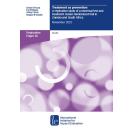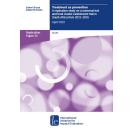Risk sharing and transaction costs: a replication study of evidence from Kenya’s mobile money revolution
3ie Replication paper 22, 2019
M-PESA, a mobile phone-based service for transferring money, provides a gateway to formal financial services for populations that otherwise would not have access to them. Jack and Suri (2014) analysed a panel of 2,282 Kenyan households over the period 2008 – 2010 to estimate how M-PESA has enabled financial risk sharing. They focused on negative economic shocks, such as illness or drought, and analysed how family members and friends shared financial resources during these adverse events. The authors concluded that M-PESA users were largely able to protect their consumption when faced with negative income shocks, relative to non-users. Users were more likely to receive remittances in the face of negative shocks, receiving both a greater number and higher value of remittances. Users also received remittances over greater distances and from a wider network.
This replication study starts with the twin strategies of push-button and pure replications of the original study. It then followed this up with various consistency and robustness checks, such as propensity score matching and the Tobit model specification. Heterogeneous effects were explored by comparing benefits across urban and rural residents. The latter are expected to particularly benefit from M-PESA, as they are more likely to be excluded from formal financial services.
The original findings and this replication provided strong empirical evidence that M-PESA has had a positive impact on people’s financial health. The financial benefits derived from market-based mobile money innovations can play a role in combating world poverty.

